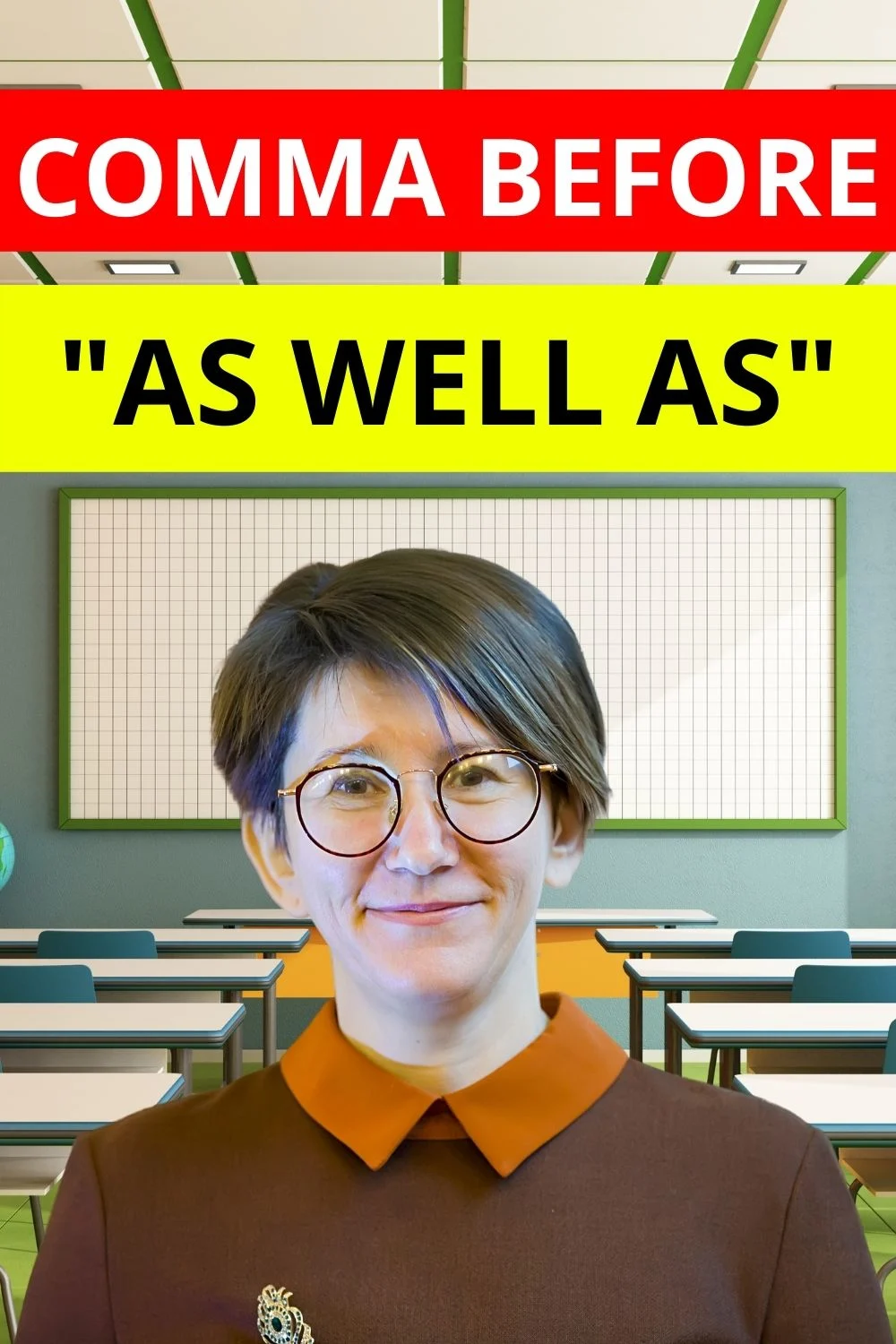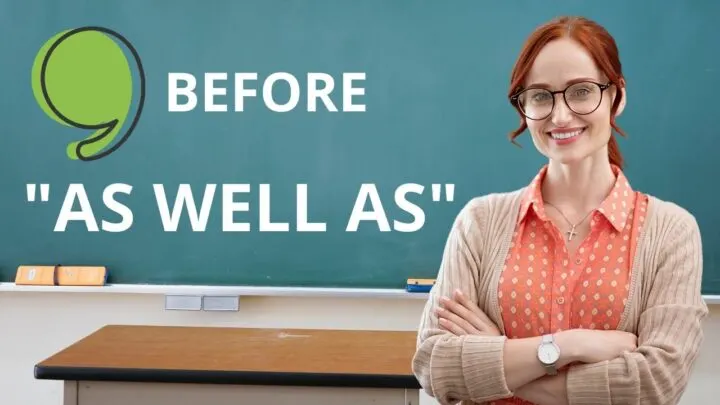Welcome, dear Linguaholic! Today, we will discuss the good and bad results of our actions toward others.
Oops, sorry that’s “karma.” What I meant was the one without the r-sound in the middle, “comma.”
Commas are notorious for savagely annoying many students and office workers alike, not to mention natives and non-native English users.
Ambiguous phrases like “as well as” follow some easy, general patterns when they appear in sentences, so does the pre-comma placement. Scroll down to know them.
When do we need a comma before “as well as?”
A comma before “as well as” should be placed only if it introduces either a parenthetical mid-sentence remark or end-sentence remark, be it a word, a phrase, or even a clause. However, a pre-comma must not be inserted when it is used as a conjunction or preposition that compares ideas with equal weight or strength.
Getting to know “as well as”
“As well as” is most commonly recognized as an additive transition phrase whose main existence is, you guessed it, add information.
It is also conventionally believed and explained to denote a similar sense to the word “and” for the purpose of making information sharing more convenient.
Due to this catch-all explanation, some grammatical issues have been occurring because the language user gets prompted to think that there is more than one subject involved.
So, it is best to explain the meaning of “as well as” as something similar to “in addition to that” instead.
To be more precise, “as well as” bears the meaning “not only…but also” which is used to emphasize the existence of an idea.
Thus, the last example actually emphasizes “Dylan,” and at the same time, recognizes “Brian” as the other doer of the action.
When we see a noun, a noun phrase, or a pronoun following “as well as,” it syntactically functions as a preposition used for comparison purposes.
But when we see a clause afterward, “as well as” functions as a conjunction or clausal connector.
The possibility of using “as well as” in this sense also contributes to the ambiguity of the phrase, which is also often explained to denote the same meaning as “like.”
The meaning of “well” in the sentence below is similar to “good” but used in an adverbial manner.
To add insult to injury, “well” may also mean “healthy,” an adjective, albeit less likely used by most people.
Well, the details above only reveal that the English language is as beautiful as the sunset in the Grand Canyon, isn’t it?
(By the way, I used “well” as a filler word or an exclamatory expression in the last sentence. Hope you’ve noticed it.)
The silent rift between “As well as” and “And”
English grammatical conventions and style authorities like the Chicago Manual of Style suggest that “as well as” may be used to simply mean “and.”
As this is the case, people have made this as a catch-all explanation when someone asks the question “what does ‘as well as’ mean” or “how to use ‘as well as’ in a sentence.”
But why not?
If this is one way to make a language easier to understand, especially as far as new learners of English go, then I guess it would do more good than harm.
However, it should also be natural to ask more complex questions as our linguistic repertoire becomes richer and richer.
Therefore, we can deduce that noticing the subtle nuances behind “as well as” are, in fact, a sign of linguistic progress.
Asking questions related to comma usage also demonstrates that people are indeed interested in understanding how linguistic devices work, which is pivotal in the healthy sharing of information.
So, without further ado, here are the guidelines in deciding whether or not to place a comma before “as well as.”

Placing a comma before “as well as”
We sometimes see “as well as” being preceded by a comma yet sometimes not, which is not an isolated case because this can happen to other phrases too.
Apparently, this reveals that comma rules are not essentially carved in stone, but are also dependent on stylistic reasons.
Here are (see below) the two notorious reasons why a comma precedes “as well as” in sentences that go beyond the most widely-recognized serial comma placement.
When “that” introduces a mid-sentence parenthesis
A parenthesis is a stylistic device that allows a writer to insert remarks within a sentence that is separated with a comma for emphasis.
Parenthetical remarks can be in a form of a word, a phrase, or a clause that adds meaning to the statement.
Since a parenthesis’ job is to “add” meaning, we can say that they, therefore, serve as auxiliary devices used to decorate the sentence.
On that note, we can also conclude that they are nonessential sentence elements, but they are indeed very helpful in making the sentence much prettier.
Nonessential sentence elements like parentheses appear anywhere within the sentence.
Hence, when “as well as” is used to introduce a parenthetical remark midway, then it should be preceded by a comma.
Here’s an example of how it is used.
Notice that the verb “are” is used in the sentence above. This is because of the presence of the two subjects, rooms A and B.
However, we should use “is” when there is only one entity before the parenthetical remark.
You can simply imagine an administrative staff checking these details through the computer who seems to be slightly caught off guard upon knowing that room B is also unavailable.
This has been the reason why she needed to create an emphatic remark introduced by “as well as.”
When “as well as” introduces an end-sentence parenthesis
Now that we know what parenthetical remarks are, it should be easier to understand that an end-sentence parenthesis also needs a pre-comma placement.
Adhering to the same emphatic purpose, an end-sentence parenthesis usually occurs when the meat of the sentence is already lengthy, but the writer meanwhile wants to highlight the last part.
Here’s how we can do that using “as well as.”
The sentence above implies that the subject being described is not only charismatic but also humorous.
Parenthesizing the remark introduced by “as well as” at the end creates the effect that the comment is something beyond usual expectations.
The incorrect comma before “as well as”
Now, that we’ve seen how and when to insert a comma before “as well as,” let us also look at the condition in which the comma becomes incorrectly placed.
When “as well as” is used as a preposition
Comparative prepositions help in parallelizing the weight of ideas within sentences, which can also be done with “as well as.”
As mentioned earlier, the phrase functions as a preposition when it is followed by a noun, noun phrase, or a pronoun.
Note though that the sentence above means that the subject is not as good a singer as his sister, but he can sing too.
Should that be the intention of the writer, then a comma cannot be placed before “as well as.”
However, if the intended meaning is the one that denotes “not only…but also,” then a comma should be placed.
Doing so shifts the meaning of the statement to “both people being bad singers,” or, “not only his sister, but also Dylan, cannot sing well.”
Therefore, the writer’s intended meaning should be a precursory element to the comma decision.
When “as well as” is used as a conjunction
It was also stated earlier that “as well as” may function as a conjunction when it is followed by a clause rather than a noun or pronoun.
And, it has been repeatedly stated that “as well as” more precisely denotes the meaning “not only…but also,” which is a correlative conjunction.
When the sentence is made up of two independent clauses, a comma is necessary to separate them.
However, when the meaning of the subsequent clause is dependent on the initial clause, a comma should not be placed at all.
Therefore, a comma shouldn’t be inserted when we are using “as well as” as a conjunction that attaches a dependent clause at the latter part of the sentence.
The dependence of the second clause can be revealed by how meaningless “dad does” is when taken out from the whole sentence.
Therefore, the only way to interpret its meaning is by attaching it to the initial independent clause “Mom never cooks.”
When using “as well as” this way, we must not separate it with a comma, not unless it is particularly treated as a parenthetical remark.
Bear in mind though that the prepositional and conjunctive functions of “as well as” should only fall under the no-comma guideline if and only if they are non-parenthetical elements.
Frequently Asked Questions on Comma Before As Well As
When do we need a comma before “such as?”
A comma should come before “such as” when it introduces a parenthetical remark for the purpose of only “adding” meaning to a sentence that can still be considered as grammatical even without the such-as remark. “We can visit your grandpa’s farm this summer and do some fun stuff, such as horseback riding and fruit picking.”
How can we use “as well as” in a sentence?
We can use it as a conjunction in which “well” means “good” but in an adverbial sense, such as in “His dog swims as well as he does.” Or, we can also use it as a preposition that means “like” as in “He dances as well as Channing Tatum does.”
What is a synonym for “as well as?”
“In addition to that,” “not only…but also,” and “and” are synonymous to “as well as,” but they should not be treated as direct and instant replacements.
Conclusion
English is loaded with ambiguous words and phrases like “well” and “as well as,” which is one of the reasons why languages remain to be fun and interesting.
Hence, these kinds of ambiguities can be made clearer by reading definitive and complete grammar-related blog posts, such as this one.
Thanks for reaching the end! See you next time-

Hey fellow Linguaholics! It’s me, Marcel. I am the proud owner of linguaholic.com. Languages have always been my passion and I have studied Linguistics, Computational Linguistics and Sinology at the University of Zurich. It is my utmost pleasure to share with all of you guys what I know about languages and linguistics in general.


